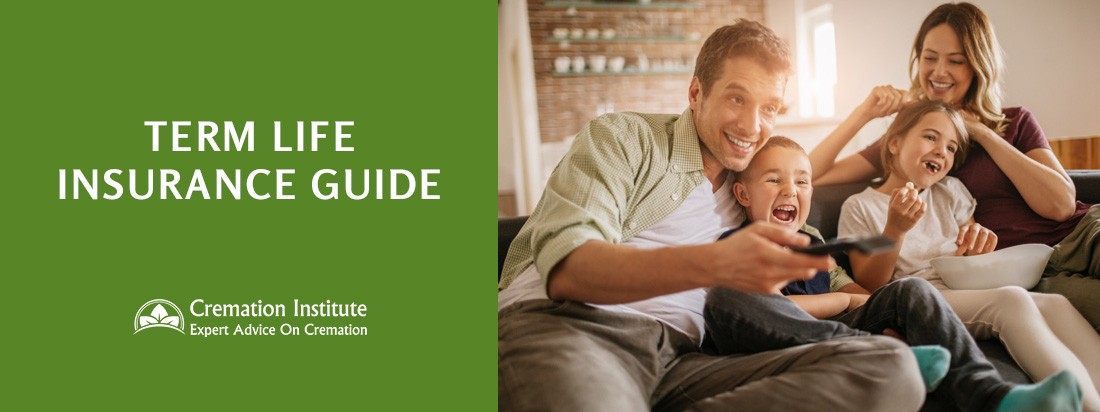Term Life Insurance Explained In 2023: Is It Worth It?


Written by Kim Pinnelli: Life Insurance Advisor
 Reviewed by Adam Binstock On May 3, 2020
Reviewed by Adam Binstock On May 3, 2020
Article Highlights
What Is It? Is It Worth It? It’s Appropriate For Term Life vs. Permanent Insurance Types Of Term Life Coverage Policy Options Costs & Premiums Cheap Life Insurance FAQ’s Best Term Insurance Companies Getting a QuoteTerm Life Insurance is probably the most popular option on the market.
It’s simple, affordable, and will keep you and your family protected.
But is it worth it? In most cases, absolutely.
In this independent review, I will give you all the information you need to know about term life insurance.
I’ll go through a typical policy, talk about costs, coverage, alternatives, and also recommend some reputable insurance companies.
What Is It?
Term life insurance is a death benefit cover that is valid for a specific number of years.
If you die before the policy expires, your beneficiaries receive the full amount of the death benefit as a tax-free benefit, typically as a lump sum payment.
If you are alive at the end of the term, you have a few choices. If you chose a term that would last until you were financially stable (no mortgage, kids grown, etc.) you may just let the policy expire.
But if you still need coverage, you have the option to apply for a new policy or convert your existing policy into a whole life insurance policy with the same company.
Is It Worth It?
Many people wonder if term life insurance is worth it, especially since it expires. The answer is a definite- yes, it’s worth it. Here’s why.
Safety first
It provides you with a financial safety net. Stop and think about what would happen to your family if you died tomorrow. If you are the breadwinner or even if you aren’t, what financial implications would your family feel on top of the grief they’re going to experience?
Term life insurance provides that safety net when you need it the most, typically your younger adult years.
Debt protection
As you just start out in life, you likely have a mortgage, kids to support, and other debts you carry. If you die suddenly, your family is left without your income, but they still have the debts and now they have to pay for your final arrangements as well.
Term life insurance could help cover all of those costs and more, giving them some peace of mind as they learn to navigate their new normal.
Pros:
Affordable
Term life insurance is the most affordable life insurance available
Predestined
You know the expiration date, so you don’t pay for coverage you don’t need once you’re financially stable (have money for retirement, have money saved for final arrangements, etc.)
Protection when you need it most
It provides the protection you need when you need it the most. You can secure enough coverage for the mortgage, other debts, and to support your family financially for years following your death.
Cons:
Expires
The coverage does expire. If you aren’t financially stable and/or want to leave a legacy, the coverage won’t be there if you outlive the term.
No returns if you outlive the term
You don’t receive any interest or dividends. If you outlive the term, that’s it, you don’t see any financial value from the product.
Premiums are higher if you apply when you’re older or have health problems
The longer you wait (the older you are) or the more health problems you have, the more expensive the premiums get.
It’s Appropriate For
Term life insurance is a viable product for just about anyone, but it’s best for anyone with the following:
- Dependents, whether a spouse or kids that depend on them financially.
- Debts they will leave behind (the beneficiaries become liable for it).
- The desire to cover the cost of their final arrangements.
- The desire to pay for college education for children or other beneficiaries.
- The desire to create a legacy.
Term Life vs. Permanent Insurance
The two most common words you’ll hear with life insurance are term-life and whole-life.
How do you choose between the two? Here are the major differences:
Term Life Insurance:
- Lasts for a specific term up to 30 years.
- Has low premiums.
- Doesn’t accumulate a cash value.
- Has a guaranteed death benefit.
- Doesn’t offer the ability to withdraw cash or take a loan.
Whole Life Insurance:
- Lasts for your lifetime (as long as you pay your premiums).
- Costs as much as 5x term life insurance.
- Accumulates a cash value that you can withdraw and/or borrow from.
- Has a guaranteed death benefit.
- Has premiums that never change.
Types Of Term Life
Guaranteed level term life insurance
You choose the death benefit amount and the term.
The premiums remain level for the term and your beneficiaries receive the full amount of the death benefit upon your death – if you die within the term.
It may also have a renewable clause, with higher premiums at the end of the term, because your risk of death increases as you age.
Return of premium term life insurance
You pay set premiums for the term that you choose (up to 30 years). If you are alive at the end of the term, the insurer returns the premiums paid.
The premiums are higher than guaranteed level term life insurance premiums but you can then invest the funds received, saving them as a benefit for your loved ones upon your death.
Annual renewable term life insurance
This is like a temporary life insurance policy. You renew it each year and for a selected period.
Each year, the policy premium increases as you age. Some policies do guarantee the premium for the first five to ten years though.
Decreasing term life insurance
The payout value of this policy decreases annually (sometimes monthly). Many people use this type of policy to cover a loan. So they know if they die, their loved ones will have enough finances to pay off the loan.
The amount can decrease according to the loan amount decreasing with your payments.
The premiums are also typically lower than standard term insurance.
This is good for those that will have higher income in years in the coming years and just need the ‘extra coverage’ for now.
Coverage
Another question everyone has is – “how much coverage do I need, what is the right amount?”
There isn’t a one-size-fits-all answer here. You’ll have to do some digging and figure out what you want to cover.
But here are a few ideas:
Income
Do you need to replace your income? If your dependents rely on your income and would face difficulties without it, calculate this into the amount of coverage you need. Determine the number of years you’d want to cover for your dependents and multiply it by your annual income.
Current debts
Look at your debts. We’re talking big debts here, like your mortgage, large credit card debt, and other large debts that will be around for many years.
Your life insurance amount should cover these debts. Just because you die doesn’t mean that your debts die too – they become the responsibility of your estate.
Stay at home parent income
Stay at home parents may not make an income, but they’re still worth a lot of money when they aren’t around.
Think about the services you’ll have to have in order to do everything a stay-at-home parent did, such as watching the kids, cooking, cleaning, and managing the errands.
If you need to hire services to help you with these tasks, it could be worth including in your spouse’s life insurance coverage.
Number of dependents
Think of the number of dependents you have and their financial needs. Are your children young, requiring many years of support? Do you want to pay for their college education?
The more dependents you have, the more coverage you want/need.
Funeral expenses
The average funeral costs between $9,000 – $15,000. Your life insurance can help cover those costs, giving your loved ones peace of mind while they grieve their loss.
Consider the type of funeral you want and any other final arrangements you have in mind when considering the cost.
Policy Options
Return of premiums
This option helps you get money back from your premiums if you outlive your policy. Generally, after a term expires, the policy ends and you don’t see any of the money you invested.
This rider/policy add-on gives you the ability to get some or all of your premiums back, but the premiums for the policy are generally higher.
Accelerated death benefits
If you become chronically ill, you may be able to accelerate some of your death benefits to help you pay your medical bills.
Most companies allow this if you’re expected to live less than 24 months, are placed in a nursing home permanently, or have a serious illness that reduces your life expectancy, such as AIDS, heart disease, or you need an organ transplant.
You may be able to receive between 25% – 95% of your death benefit.
Disability waivers
If you become disabled, you may be able to stop making your premium payments, but keep coverage. Generally, you must be disabled for six months or longer for it to count.
Accidental death
This increases your death benefit if your death is accidental. Your beneficiaries may receive between double and triple the amount, if your accident qualifies.
Make sure you read the fine print on the policy to know how it works though.
Costs & Premiums
Term life insurance rates vary based on your qualifications. Your age, health, gender, and chosen riders play a big role in the overall cost.
In general, the younger and healthier you are, the lower the rates you pay.
Typically, life insurance rates for women are lower than those for men because women have a longer life expectancy than men.
If you add riders to your policy, they will increase your premium rates.
Riders give you more options for coverage, to accelerate benefits, or to even double your payout.
The more riders you add and the more ‘risk’ an insurance company takes in paying out on your policy, the higher the premiums they’ll charge.
Let’s look at the average cost of term life insurance for men and women.
For a $500,000 term policy, the difference between men and women is as follows:
- 30-year old woman with a 20-year policy – $195 annually
- 30-year old male with a 20-year policy – $229
- 40-year old woman with 20-year policy – $293
- 40-year old male with a 20-year policy – $344
Cheap Life Insurance
Term life insurance is the least expensive type of life insurance available today, but there are still ways to ensure that you get the best rates:
- Get term life insurance at a young age, the older you get the more expensive the premiums
- Take good care of your health. When you sign up for life insurance, you have to get a medical exam. The healthier you are (low cholesterol, low blood pressure, healthy weight, etc.), the lower the rates
- Don’t have poor lifestyle habits. Don’t smoke or drink excessively. Exercise as much as you can.
- Try to avoid bankruptcy. Even though it doesn’t affect your health, it’s a negative credit event that life insurance providers look at as risky as it increases your risk of making poor health choices.
- Have safe hobbies. Don’t risk your life with hobbies such as sky diving or scuba diving, as these increase your risk of death and therefore your premium rates.
FAQ’s
What happens to term life insurance at the end of the term?
You have a few options after term life insurance ends. You can let it go, convert it to a whole life policy, or apply for another term life insurance policy.
What happens if I outlive my term life insurance policy?
If you’re still alive at the end of your term life insurance policy, you should reassess your situation.
Do you need insurance still or are you financially stable enough to be without it?
If you do need a policy, talk with your agent about converting to a whole life policy or applying for a new term policy.
Can you cash in term life insurance?
No, term life insurance doesn’t have a cash value. The only benefit paid out is to your beneficiaries upon your death, if you die within the policy’s term.
Do you get your money back after term life insurance?
Typically, you don’t get your money back after term life insurance.
However, if you have a return of premium life insurance policy, you may be eligible to receive some or all of your premiums back, but the premiums you pay are much higher than a regular term policy.
Can you cancel term life insurance?
Yes, you can cancel a term life insurance policy at any time. There are no fees or penalties for doing so.
Best Term Insurance Companies
Northwestern Mutual
Northwestern Mutual offers 4 term life insurance policy options which include both level premium and annually renewable policies.
They have the best program for converting to a whole life policy if you decide you need it. They also have an A++ rating from A.M. Best.
New York Life
New York Life has incredible financial stability, which is important for an insurance company. You want a company that will be around to payout when you need it.
Moreover, they offer a variety of term life insurance policies which include short-term policies and policies that are customized to fit your needs. New York Life has competitive premiums too.
MassMutual
MassMutual has an A++ A.M. Best rating and offers level premium policies that are guaranteed for a specific period.
They also allow the benefit of converting your term policy to a whole life policy if you desire.
John Hancock
John Hancock Insurance excels in customer service. They offer term life insurance policies starting at $100,000 and in various terms of 10, 15, or 20 years.
They also offer the option to convert to a whole life policy at the end of the term.
Transamerica
Transamerica has an A+ rating from A.M. Best and offers term life insurance policies from $25,000 to $2,000,000.
Furthermore, they offer term life insurance policies for people over 50-years-old (up to 58) and with a 30-year term, which is unique to them.
State Farm
State Farm offers term life insurance policies up to $250,000 and for 10, 20, or 30-year terms. You can renew your policy up to age 95, with increasing premiums.
They also offer great bundling discounts if you choose to secure your home, auto, and life insurance through them as well.
AIG
AIG offers a few unique policy options including terms up to 35 years and a policy that returns your premiums if you don’t make a claim.
They have an A rating with A.M. Best plus rate high in customer satisfaction.
Getting a Quote
We recommend that you shop around to get the best life insurance rates. Compare your options – see what each insurer will offer you.
When you do shop around, make sure you compare prices of similar policies.
Look at the terms, coverage amount, and read the fine print. Sometimes the features will play a more important role than the premiums themselves.
Also, make sure you know the approval process of each company.
Some insurance companies require a medical exam while others do not. Some companies operate solely online while others require you to talk with an agent.
Know your options when shopping around so that you understand the big picture and get the policy that makes the most sense for you.


